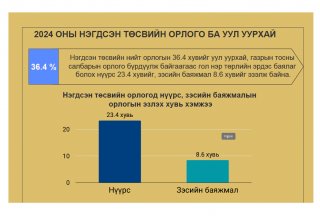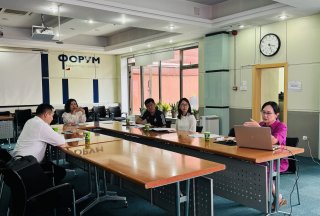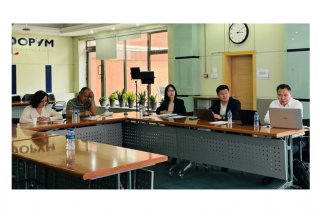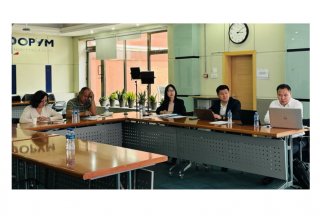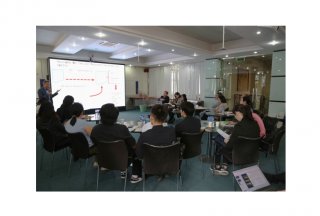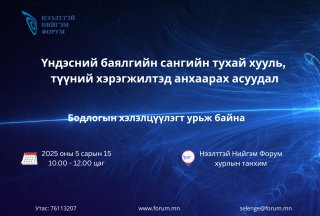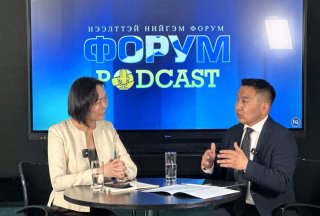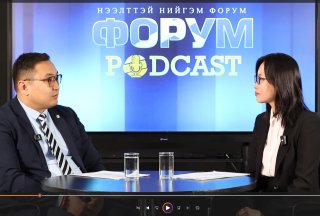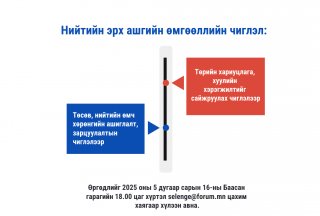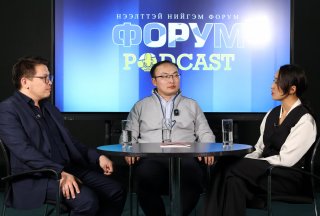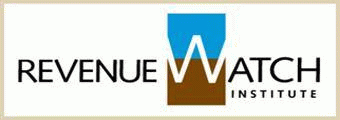
Quarterly Newsletter March, 2007
WELCOME to RWI’s first newsletter! We would like to thank everyone who contributed. Below are some highlights of our networks activities over the course of the past few months, as well as information about publications and upcoming events. We look forward to continued cooperation with all of you!
In this issue:
Country/Regional and Partners’ Updates
1. Global Witness Campaigner Detained Indefinitely Angola
2. Ecuador and RWI to Partner on Improving Transparency and Public Monitoring of Oil Revenues
3. Iraq Revenue Watch Update
4. Developments in Trinidad and Tobago and Bolivia
5. RWI Begins Development of Pilot Projects at Regional and Local Levels
6. RWI Exploratory and Outreach Visit to Indonesia
7. Southern Africa Revenue Watch Update
8. Public Transparency and Budget Advocacy (PTBA) in Angola Update
9. OSIWA PWYP-EITI Regional Initiative in 11 Countries Announcement
10. Georgia Revenue Watch Program Update
11. Azerbaijan – Transparency of Oil Revenues and Public Finance Update
12. Kazakhstan Revenue Watch Program Update
13. EITI and Other Developments in Kyrgyzstan
14. Publish What You Pay International
15. International Accounting Standards
1. RWI Op-Ed on US Oil Revenues Management
2. Escaping the Resource Curse Book Publication
3. EITI Audit Guide Project
4. Nigeria Policy Brief
Upcoming events
1. Kazakhstan Regional Meeting, March 26-27, 2007
2. EITI Board Meeting Berlin April 10-11, 2007
3. G8 Energy Security and Governance Workshop with Civil Society in Bonn, April 25-26, 2007
4. Launch of New RWI Website, May 2007
5. Stanford Workshop on Oil Governance, May 11-12, 2007
6. RWI Governing and Advisory Board Meetings, May 14-15, 2007 in Menlo Park, California
7. EBRD Annual Meeting, May 20-21, 2007, with RWI Director Speech
8. Launch Event: “Escaping the Resource Curse,” June 19, 2007 in Washington D.C.
9. Investors’ Meeting in London, Summer/Fall 2007
10. RWI Summer Training/TIRI Policy Lab on Natural Resource Revenues, June 24-July 11, 2007
Staff Announcements
1. New MENA Regional Director/Senior Advisor
2. New Program Coordinator for Indonesia/Southeast Asia
3. Open Positions
4. RWI Advisory Board Nominations
Country/Regional and Partners’ Updates
1. Global Witness Campaigner Detained Indefinitely Angola
Global Witness Campaigner Sarah Wykes was arrested by armed Angolan police on the morning of February 18, 2007 in Cabinda, while visiting the oil rich enclave to meet with local civil society representatives. She was taken from her hotel to a police station, not given food or water for at least 5 hours and finally taken to the local jail where she was held without charges for three days, until finally released. She was then held in Cabinda for several days and was finally allowed to travel to Luanda on February 27, where she is now. She has been notified verbally of the charges against her which involve an alleged violation of Article 26 of Angolan law relating to crimes against national security. Sarah and her lawyer have requested access to documentation relating to these charges and to any evidence against her but so far, permission has been denied. Espionage cases can take years to come to trial, and Sarah’s bail conditions require that she seek permission from the Angolan authorities if she wants to leave the country. Sarah has appealed to the Angolan authorities for permission to leave the country, with no response to date. PWYP has organized a massive international advocacy response that has included letters from high-ranking members of the Senate Foreign Relations Committee to Angolan authorities along with the interventions of the World Bank, UK Foreign Office, EU and others. RWI is working to support Global Witness and the PWYP Campaign’s continuing advocacy efforts on Sarah’s behalf, and is assisting in the identification of counsel for her. Any additional advocacy and outreach efforts by RWI’s network on Sarah’s behalf would be greatly appreciated.
For further information please contact Gavin Hayman at [email protected], +442075616361.
2. Ecuador and RWI to Partner on Improving Transparency and Public Monitoring of Oil Revenues
In late January, 2007 a RWI delegation (Karin Lissakers, RWI consultant Carlos Monge and RWI policy analyst Juan Carlos Quiroz) visited Quito, Ecuador, at the invitation of the Minister of Energy and Mines, Minister Alberto Acosta. While in Quito, the RWI team met with senior officials from the Government, the Central Bank and PetroEcuador. The team also met with representatives of international organizations, bilateral donors and civil society organizations.
Ecuador ranks third in South America in terms of oil reserves with 5.1 billion barrels of oil at the beginning of 2006. Oil production started in the 1970s and it reached nearly 540,000 barrels per day (bpd) in 2005. Domestic consumption has remained stable around 130,000 bpd, with the remaining being exported. The petroleum sector represents 12 percent of Ecuador’s GDP and generates about one-third of the government revenues and 40 percent of export earnings. However, management of the sector has often created political tension, legal battles, and civil unrest. PetroEcuador, the state-own company and the largest producer, is mired in opacity and inefficiency.
The main outcome of the meetings was agreement on a concrete program of action with the Government of Ecuador to immediately begin a mapping of what kind of information on oil revenue is available, how reliable it is, who collects it, and how much of it is made public. In addition, RWI will help the Government organize a public discussion on the results of this initial exercise and to set up a group of civil society organizations to monitor oil revenues and improvements in transparency. The government agreed to create a Working Group to facilitate contact with all the relevant actors in the petroleum sector and the administration of oil revenues. RWI also agreed to help the government assess whether Ecuador should participate in EITI. A press release by RWI and the Government of Ecuador on this project is forthcoming.
For further information, please contact Juan Carlos Quiroz at [email protected]
From August-December 2006, RWI and the United Nations Development Program arranged to second IRW Director Yahia Said to UNDP in Baghdad, where he led the process to develop the International Compact with Iraq, a comprehensive medium term framework for reform and reconstruction of Iraq in the socio-economic, political and security areas. Based on Yahias work EITI is now in the Compact main document. The Compact has been approved by the Council of Ministers. It is also mentioned in the latest UNSCR making it almost law and while the overall status of the compact is unclear at present given the security crisis, the government has been moving forward over the past few months on some of the economic principles and benchmarks contained within the document, specifically the drafting and finalization of a new national petroleum law.
During and after Yahia’s secondment to UNDP, he worked with Joseph Bell and a team of Iraqi former and current government officials to provide suggestions to the committee drafting and negotiating the law, with a specific emphasis on transparency and accountability provisions and the sharing of power and resources between the federal and regional levels. The draft law was finalized and approved by the Cabinet in late February, 2007. It contains EITI implementing provisions among other historic transparency provisions for the country, including updated web publication of oil revenues and full contract transparency. While containing weaknesses and ambiguities, the draft law represents a step forward towards reviving the oil industry as an engine of economic reconstruction. Yahia is preparing an RWI commentary on the law for publication this month and will be promoting public debate on the law both on the IRW website and through other media. Yahia and RWI are also now attempting to facilitate assistance to the government in drafting the revenue-sharing and distribution legislation that will accompany the oil petroleum law to Parliament for consideration later this year.
In January 2007 Yahia testified before the Senate Foreign Relations Committee about the relationship between oil and conflict in Iraq, and opportunities for national reconciliation based on an equitable resolution of oil sector management and revenue distribution. In February 2007 Yahia Said visited Washington DC where he met with IMF, Treasury, NSC and UN officials and lobbied on behalf of EITI implementation support for Iraq to move forward with the commitments it has now made. He has also been encouraging the IMF to play a more proactive role on the new petroleum legislation, to place constructive pressure on all parties within Iraq to uphold key transparency provisions within the law as it makes its way through parliament, and to achieve workable compromises on issues of revenue distribution that meet the needs and concerns of the regions while still meeting constitutional requirements and not jeopardizing the integrity of the federal budget and negotiation process as a whole.
For further information please contact Yahia Said at [email protected].
4. Developments in Trinidad and Tobago and Bolivia
Trinidad
RWI Deputy Director Julie McCarthy traveled to Trinidad and Tobago (TT) in September, 2006 on a RWI scoping mission to explore possible projects on monitoring, advocacy and capacity-building regarding the oil and gas sectors. Julie’s meetings with a wide variety of government, civil society, media and private sector actors suggested that EITI was floundering in TT—despite the country’s special status as one of the earliest EITI pilots—due to lack of public awareness and tepid political will. With the help of RWI Advisory Board member Tony Paul, Julie identified a strong local civil society coalition called the Sustainable Development Network to begin discussions about forming a RWI supported energy policy analysis and advocacy project, with a heavy focus on EITI implementation in TT. RWI consultant Carlos Monge followed up on Julie’s trip with a visit to TT in December 2006, where he worked with SDN to develop a concrete work plan and proposal. The SDN is reviewing a draft version of the project and agreement is expected to be reached soon.
Carlos also spoke publicly to government, civil society, media and the private sector, and presented on EITI and Peru (his native country’s) experience implementing the initiative, and was told that the government has recently decided to move forward with implementation at full steam and will be forming a formal multi-stakeholder committee imminently.
Bolivia
On February 13, responding to an invitation of the Bolivian Vice Minister of Transparency and Fight Against Corruption, and coordinated through the World Bank, RWI consultant visited La Paz, following up on his previous visit with RWI Deputy Director Julie McCarthy in November 2006. In the course of the visit, Carlos presented the EITI experience, process and perspectives to Ms. Casimira Rodriguez, Minister of Justice and Human Rights, and to Ms. Nardi Suxo, Vice Minister of Transparency and Fight Against Corruption. Similar presentations were made to Senator Maria Ester Ugarreta and Deputy Elizabeth Salguero, both belonging to Movimiento al Socialismo, the party in government.
Apart from the presentations, Carlos also held more extended technical conversations with Vice Minister Suxo on EITI and the processes taking place in Peru, Ecuador and Trinidad and Tobago. Overall Carlos found that in terms of the actors that could promote EITI in Bolivia and could assist the Bolivian Government in implementing it –due to the existing political tensions- the WB and USAID may face difficulties in relating with the current administration. Carlos’ sense is that it is probably best if the EITI Secretariat as such and/or private foundations –such as RWI, OSI, OXFAM and others- approach the Government on these matters. In this line of thought, Carlos discussed with Vice Minister Suxo some lines of collaboration that RWI could provide in terms of laws enshrining transparency principles and access to public information, for example.
For further information, please contact Carlos Monge at [email protected]
5. RWI Begins Development of Pilot Projects at Regional and Local Levels
RWI is developing sub-national pilot projects in two countries, Peru and Indonesia, aimed at improving the transparency and use of extractive industry revenues and the impact of extractive industries by working with civil society and governments at the regional and local levels. Carlos Monge and Vanessa Herringshaw recently completed an exploratory mission to Peru in February 2007 to scope potential approaches, together with Adrian Ionescu of OSI’s Local Government Initiative.
Thinking is at an early stage, but issues specific to Peru include:
· Whether we should focus on the normal allocation of extractive revenues from central to sub-national governments or on the new ‘voluntary contributions’ that the mining sector has agreed to fund and to spend themselves (rather than through government) at the risk of legitimizing the latter’s rather ad hoc, parallel approach
· How to make best use of emerging approaches that link multiple local governments (e.g. mancomunidads) or multiple levels of government (e.g. agreeing shared priorities between regional and local governments and pooling resources)
· How to coherently address the very different issues generated by mining in highly populated areas versus those of mining in sparsely populated areas and oil extraction off-shore
Issues that are likely to be of relevance to both countries include:
· Coordinating capacity development with both government and civil society so that they reinforce each other over time
· Determining the real barriers to good use of extractive revenues and linking advocacy at national level to remove barriers with capacity building at local levels
· Using the local pilots within the national EITI process, to drive practical testing of approaches, to generate pressure from sub-national actors and track impact
· Setting meaningful boundaries to RWI’s technical assistance to improve revenue use. Is our role only to support transparency, planning and budgeting processes? Or to provide the specialist assistance necessary to translate these into strategic development projects like engineering roads or designing primary health systems?
For further information please contact Vanessa Herringshaw, [email protected] or +44 (0)7900 492631
6. RWI Exploratory and Outreach Visit to Indonesia
In February 2007, Karin Lissakers, Julie McCarthy, Vanessa Herringshaw and Rebecca Iwerks made an exploratory trip to Indonesia to lay the groundwork for an intensive EITI capacity-building project with civil society and local governments in oil, gas and mining producing regions. RWI staff had a very positive meeting with the Minister of Finance Sri Mulyani about the possibility of Indonesia implementing EITI in the coming year, and also many meetings with civil society, media, government, donor and private sector actors to begin identifying local needs and priorities. Vanessa Herringshaw will return to Indonesia in May 2007 for further meetings and more intensive groundwork towards establishing RWI pilot capacity-building projects around EITI and extractive revenue management in 2 provinces, most likely East Kalimantan and Aceh. Papua and Riau are also presently under consideration. RWI will also be hiring a national level full-time EITI/PWYP coordinator for Indonesia in the coming months, who will begin galvanizing and informing civil society research, monitoring and advocacy around extractive revenue transparency this year. Outside donor support has been expressed for RWI’s pilot projects from organizations such as the Ford Foundation and the Decentralization Support Facility which represents donors such as DFID, GTZ, Ausaid and the World Bank in Indonesia. OSI’s Local Governance Initiative may also join forces with RWI to provide some technical assistance support to local governments aimed at enhancing their extractive revenue management capacities. In the near term, RWI will be working with the TIFA Foundation to conduct research on the current availability and accessibility of information around extractive industry revenues, budgetary information and relevant laws and institutions. RWI also continues to engage directly with the Ministry of Finance, providing information and encouragement around EITI implementation.
For further information, please contact Rebecca Iwerks at [email protected] or Dedi Haryadi, Program Officer for Local Governance Tifa Foundation, + 62 21 829776 ext.124, [email protected].
7. Southern Africa Revenue Watch Update
At the end of 2005, the Open Society Initiative of Southern Africa initiated the Southern Africa Resource Watch (SARW). SARW’s main objectives include:
- To monitor corporate and state conduct in the extraction and management of natural resources in Southern Africa region, in particular assessing to what extent these efforts contribute to sustainable development
- To consolidate research and advocacy on natural resource extraction issues in Southern Africa
- To put a spotlight on the specific dynamics of natural resource management in Southern Africa region, building a distinctive understanding of the regional geo-political dynamics of resource economics.
- To provide for researchers, policy makers and social justice activists especially in academic and civic spaces- a platform of action, coordination and organization in the monitoring and strengthening corporate and state accountability in natural resources extraction.
- To highlight the relationship between resource extraction activities and human rights as they obtain on the ground, and develop advocacy efforts that engage this reality
The emphasis for the first three years will be on Oil from Angola and the DRC; Diamonds from Angola, DRC and Zimbabwe; Gold and copper from DRC and Zambia; Platinum from Zimbabwe; Uranium from DRC, Malawi and Namibia; Timber from DRC and Zambia and Oil exploration in various parts of the Southern Africa region.
For further information, please contact Claude Kabemba, Research Manager, (+27 11)403-3414, [email protected]
8. Public Transparency and Budget Advocacy (PTBA) in Angola Update
The "Public Transparency and Budget Advocacy (PTBA)" was launched in 2006 with the objectives of:
- Conducting a national budget analysis, through detailed studies and evaluation of its level of execution;
- Providing support (training, technical assistance and grants) to civil society organizations that are engaging in transparency advocacy work;
- Strengthening citizens’ participation in budget discourse through the provision of information;
Current activities are:
· In partnership with the Catholic University (Faculty of Economics) and Intermon Oxfam, the training of 30 activists (economic journalists, human rights activists and students of economics) on economic journalism related to natural resources;
· In partnership with the Center for Studies and Scientific Investigation (CEIC) of the Catholic University, a research study on Macroeconomy and Poverty and Social Services and Poverty;
· Capacity building of civil society organizations to launch the Publish What You Pay Campaign in Angola
For further information, please contact Albertina Delgado at [email protected]
9. OSIWA PWYP-EITI Regional Initiative in 11 Countries Announcement
OSI West Africa is presently engaged in a multi-country coalition building and strengthening project around Transparency and Accountability in the management of natural resources wealth in West Africa. The project, operated by OSIWA with some RWI support, works in conjunction with national coalitions or national host organizations to support the PWYP/EITI campaign in 11 countries. The goal of these grants and technical assistance is to develop a long-term regional strategy in partnership with local coalitions for the promotion of transparency and good governance in the management of natural resource revenues, which could efficiently alleviate poverty and bring stability in the region.
Activities planned or already underway in the region include:
(1) Launching/Strengthening PWYP/EITI national coalitions and platforms
(2) Building the communication system and strategy of coalitions (especially website)
(3) Organizing training sessions on National Budgets, Petroleum Economy, Contracts and PRSPs
(4) Participating in regional/ international advocacy conferences, seminars and activities
(5) Contributing to regional PWYP/EITI communication strategies and activities
For further information, please contact Michel Saraka at [email protected]
10. Georgia Revenue Watch Program Update
The “Georgia Revenue Watch Program” was launched in May 2005. The primary objective of the GRW is to achieve a high degree of transparency in the revenue streams associated with the operation of extractive industries in the country, as well as the operations of energy transit through Georgia, and facilitating the implementation of Extractive Industries Transparency Initiative (EITI) in the country.
In order to implement and coordinate the core principles of GRW and to bring together the existing resources and expertise in the country, GRW facilitated the establishment of a coalition of civil society organizations “for Transparency of Public Finances”. Within the scope of the GRW, the background report of extractive and energy transit industries in Georgia was published, focusing on the level of transparency in these industries. The report relates to the implementation of EITI in Georgia. In order to advocate for EITI in the country the program has: (1) organized a multi-stakeholder EITI Conference in Tbilisi, Georgia in September 2006. (2) Post-EITI conference, which encouraged reporters to conduct their own investigations into budgetary issues through a competition for the best piece of journalism in this field (3) translated the EITI Sourcebook into Georgian. The translation will serve as an illustrative guide to assist the government, companies and other stakeholders in EITI initiation and implementation. The program has also been working to develop a sample reporting template for oil and gas transit revenues, which has not yet been done by the EITI Secretariat/supporting parties but has been discussed in the EITI Board and could have important applications in other countries, including Ukraine where some civil society organizations are considering a project. .
For detailed information, please contact: Irina Lashkhi, Rule of Law and Public Administration Program Coordinator, (+995 32) 250592, [email protected] , www.osgf.ge, www.publicfinance.ge
11. Azerbaijan – Transparency of Oil Revenues and Public Finance Update
The Revenue Watch program at Open Society Institute – Assistance Foundation (Azerbaijan) is called Transparency of Oil Revenues and Public Finance. In the area of revenue transparency the program established the Coalition “For improving transparency in extractive industry”. This coalition consists of more than 80 national NGOs scrutinizing EITI implementation in Azerbaijan (www.eiti-az.org). In the area of transparency of state expenditures, the program facilitated the establishment and continued expansion of the National Budget Group (www.nbg.az). For public oversight on impacts of oil industry projects, the program has been implementing a multi-year Baku-Tbilisi-Ceyhan project involving more than 40 NGOs monitoring and auditing oil companies’ compliance with the commitments in regards to the ecological, social and human rights impacts (www.osi-az.org/btcmonitoring2.shtml). As a next step after the monitoring/audit project, the program is currently supporting the establishment of the Civic Response Network, based loosely on Alaskan-style citizens’ advisory councils. In additional to key areas of activities, the program continues to develop two auxiliary components, which are more systemized work in the area of monitoring of Access to Information law implementation and supporting the establishment of an Investigative Journalists Network.
Recent Developments:
December 22, 2006. Coalition “For improving transparency in extractive industry” held its 8th general meeting of the coalition members. Results of the coalition’s work in 2006 were evaluated and strategy for 2007 was approved.
January 13-14, 2007. National Budget Group held discussions on its Strategy and Action Plan for 2007. The strategy includes 3 directions: core project, networking projects and institutional project.
February 14, 2006. Public discussion was held among 40 NGOs that have participated in the project of monitoring and auditing of compliance of BP and its sub-contractors with the commitments stated in the operational plans for construction of BTC oil and SCP gas pipelines. Result of the discussions clearly indicated necessity for establishing a permanent civic oversight of the activities of oil companies.
February 22, 2006. National Budget Group conducted a conference where it reported on its activities in 2006 and also presented the strategy for 2007, particularly outlining proposed trends of working with the government and the parliament.
Recent Publications Supported by TORPF
Official’s Budget Guide: The book includes information on budget expenses for state administrative system and its classification, as well as regulation for salaries of officials and different expenses norms.
Control Over State Budget: International Experience: The publication reflects state and public control over budget, presents international experience of supreme state financial control and norms and procedures designed for independent and effective functioning of supreme audit institutions.
Targeted Social Assistance: In 2006 for the first time Targeted social assistance system was implemented in Azerbaijan. The book includes information on monitoring results of this system, as well as legislation and international experience.
Sumqait City Budget-2006: The concepts of city budget, its incomes and expenses, as well as level of transparency and public participation in this process were clarified in this book.
Budget Work: The publication was prepared for specialists working and studying in the budget sphere, governmental officials and university and MBA students and includes information on budget structure, incomes, expenses and deficit and inter-budget relationship.
Oil Shine of the Economy: This publication studies the effects of oil on the whole economy and Azerbaijan’s systems for oil revenue management. Experiences of many countries are illustrated for analyzing the current management system for oil revenues in Azerbaijan.
For detailed information, please contact: Galib Efendiev at (99412) 564 3 465 (ext. 305) or. [email protected]
12. Kazakhstan Revenue Watch Program Update
In March 2007, the Soros Foundation-Kazakhstan will launch a research project aimed at revealing the impact of inflation on the implementation of social and economic reforms in Kazakhstan. The paper will also examine the technique currently used by the government to identify levels of inflation in order to assess its adequacy, and will provide a review of best practices in anti-inflation policies as well as a broad range of recommendations for policy-makers.
Other research initiatives to be launched in March-April 2007 include analysis of the government’s new concept of the National Fund of Kazakhstan, and a study aimed at examining how Kazakhstan complies with the standards and recommendations from IMF’s Guide on Revenue Transparency.
Kazakhstan Revenue Watch also continues to support the Coalition of NGOs «Oil Revenues – Under Public Oversight!» established in 2004 to promote EITI in Kazakhstan. In February grants have been awarded to some organizations/members of the Coalition to participate in the work of the National Stakeholders Council on EITI implementation. Grants were also awarded to NGOs to promote EITI among mining companies (currently EITI in Kazakhstan has been mostly endorsed by the petroleum industry). The Coalition will be explaining the benefits of EITI to mining companies and encouraging them to endorse the initiative.
Work with mass media is another priority for Kazakhstan Revenue Watch this spring. The Foundation will support a series of workshops for mass media with the purpose of helping reporters to cover EITI implementation more professionally.
For further information please contact Anton Artemyev at [email protected]
13. EITI and Other Developments in Kyrgyzstan
Soros Foundation – Kyrgyzstan recently launched the second phase of its support for developing the Extractive Industries Transparency Initiative in Kyrgyzstan. The main focus in 2007-2008 will be the support of civil society initiatives in gold- mining regions of Kyrgyzstan and the development of inter-regional relations between these producing areas. The program will support monitoring and training initiatives in gold-mining regions by local communities, NGOs, local governments and mass media aimed at disseminating EITI principles and conducting information campaigns for the population on EITI implementation in Kyrgyzstan.
The program held a round table discussions on EITI in the producing region of Talas region on February 8, 2007. Participants included the Governor of Talas Oblast, the Mayor of Talas City, members (deputies) of the City Council, leaders of NGOs, mass media and representatives of gold-mining companies. During the discussion an Action Plan was elaborated to further promote EITI in the Talas region in 2007, as well mechanisms for further interaction between local communities, regional and local authorities and gold-mining companies that are working in this region. Establishment of a dialogue among the all stakeholders is quite important for Talas, given that for the last two years there have been continuous tensions between village dwellers and gold-mining companies.
There will be a similar round table discussion aiming at elaborating a joint Action Plan to support EITI by all the stakeholders on March 2nd in the Issyk Kul region – the region with the biggest gold deposits in the country.
In February, the government of the Kyrgyz Republic conducted a series of meetings in Moscow and Bishkek with the representatives of “Kumtor” and “Centerra Gold Inc.”
There were also debates held in the National Parliament on reviewing of the conditions to extract gold from the Kumtor deposit. Kyrgyz parliamentarians expressed deep concern with regards to the possible merging of “Centerra Gold” and “Eldorado” companies as it would worsen the financial situation of the Kyrgyz government.
For further information please contact Cholpon Nogoibaeva at [email protected]
14. Publish What You Pay International
PWYP held its international strategy meeting in Oslo in October 2006 to review progress to date, to develop a plan of action for the future, and appraise the coalition’s governance structures. The PWYP coalition’s objectives at the international level remain to achieve mandatory disclosure of company payments and of government revenues from the extractive industries. Going forward PWYP’s main advocacy activities will be focused primarily on monitoring the implementation of EITI and on incorporating country-by-country reporting requirements into International Accounting Standards and stock exchange listing rules. As part of PWYP’s efforts to embed revenue transparency in international norms and standards, members will continue to target the lending policies of international financial institutions, private sector banks and export credit agencies. A new advocacy priority of the coalition is to pursue transparency of extractive industry contracts. The coalition’s organizational structure will undergo some changes to increase participation by members and national civil society coalition’s in decision-making and strategic planning processes at the global level. Due to recent incidents in Angola, Congo Brazzaville, DRC and Ghana where PWYP partners were threatened and in some cases arrested and imprisoned, the security and protection of civil society partners is one of most pressing issues for PWYP.
For further information please contact Henry Parham at [email protected]
15. International Accounting Standards
Last year, the International Accounting Standards Board (IASB) responded to PWYP pressure for a mandatory requirement on company reporting by establishing a special sub-group to look into our issues. In December 2006, Karin and Vanessa met with its members to begin discussions, and have since provided the group with a list of key contacts and information sources from our network. PWYP activities on this issue now fall into three main areas:
1. Refining our policy ‘asks’ and identifying concrete ways in which the IASB could accommodate them. In our 2006 submission, we laid out a comprehensive demand covering country-by-country reporting of a wide of range of information including payments plus other information that would assist in judging the accuracy of the payments data, such as costs and profits. The submission also covered all industries, not just extractives, since most IAS must cover all sectors. Recently, we have been exploring the usefulness of adopting a more restricted demand that may have a higher chance of being accepted by the IASB. This includes a proposal to return to focusing on the development of IFRS6 which relates only to the extractives sector. The potential to use IFRS6 is currently being scoped.
2. Outreach and Advocacy. In addition to priming each of the key contacts provided to the IASB, we have three main targets for on-going outreach: board members and Trustees of the IASB and the equivalent US body, the Financial Accounting Standards Board (FASB); investors; and national accounting standard setters. Network members are urged to contribute to advocacy efforts aimed at these three groups, both within their countries and internationally.
3. Coordination with advocacy on listing and rating reform to ensure shared messages and best use of advocacy opportunities.
For further information please contact Vanessa Herringshaw, [email protected] or +44 (0)7900 492631
Publications
1. RWI Op-Ed on US Oil Revenues Management
In January 2007 RWI Director Karin Lissakers published an op-ed in the New York Times entitled “Keeping up with Nigeria,” which highlighted the gross mismanagement of US off-shore oil royalties to date, and called for the US government to introduce a ‘publish what you pay’ policy to improve the transparency and efficiency of revenue collection. RWI hopes that in addition to drawing attention to the shockingly poor domestic management of extractive revenues in the U.S., this debate will help set the stage for a similar push within Congress to support new international reporting requirements for extractive companies listed in the U.S.. The op-ed is reproduced in full below.
Keeping Up With Nigeria
By Karin Lissakers
The New York Times
January 23, 2007—In the last six months, media coverage, Congressional hearings, lawsuits by private citizens and a scathing report by the Interior Department’s inspector general have exposed a litany of failures in the department’s management of oil and gas leases on public lands and waters.
These failures have lost the government billions of dollars in royalties. They have become so glaring, in fact, that there is even speculation that the president, a good friend to the energy industry, might speak about them in his State of the Union address tonight.
If he does, he would only be about a term-and-a-half too late. Our government’s record on resource revenue management — a bipartisan record, one should add — looks more like that of a corruption-ridden failing state than that of an advanced industrial country. Many of the same failures we criticize elsewhere — for example, the mismanagement of the Iraqi oil industry — are rampant here.
Like the Iraqi government, the United States government lacks the systems to determine exactly how much oil and gas is being produced on federal properties. Private lawsuits and state investigations have exposed systematic underpayment by companies on gas leases, yet the Interior Department relies on these companies to tell the government how much they owe, with no independent verification.
The department’s inspector general, Earl E. Devaney, found that the government’s bookkeeping is so poor that it does not actually know how much money it recovered, nor how many audits it conducted. The inspector general also found the department unable to verify quantities and prices for payments-in-kind (when the government takes a share of the oil and gas instead of cash), which are a growing portion of the royalties the government collects.
Interior’s mismanagement is compounded by the secrecy that surrounds the entire enterprise. Though these are payments to the government for oil and gas extracted from public lands, companies are not required to disclose either payments or production levels to the public. The department says such data must be protected, because it could reveal pricing strategies and cost structures.
Such secrecy is contrary to the public’s right to know what is being done on public lands. It is also contrary to an emerging international standard of transparency and accountability regarding oil, gas and mining revenues — standards that the United States is pressing developing countries to adopt.
What’s more, energy companies have shown a willingness to comply with these standards. BP almost got kicked out of Angola for trying to disclose its payments there without Angola’s permission. Newmont and other mining companies have started posting on their Web sites information about taxes and fees they pay to individual governments. Statoil, a large international operator, is required by Norwegian law to report, country by country, all taxes paid at home and to foreign governments.
ExxonMobil, ChevronTexaco, Shell, Total, Anglo American and many other international oil and mining companies are part of the international Extractive Industries Transparency Initiative — under which they report all royalties, taxes, fees, bonuses and payments-in-kind.
In some countries that take part in the initiative, company payments are lumped together before publication. Nigeria, however, requires individual disclosure. Surely the United States should not have a lower standard of disclosure than Nigeria.
Congress, with the president’s encouragement, should insist that the United States practice at home the transparency it preaches abroad. It should enact a requirement that all companies extracting oil, gas and other minerals from federal lands publicly report all of their production on those lands and all royalties and other payments made to the federal government from that production.
Only then can the American public have confidence that the taxes owed by those who have benefited from the use of our public lands are being properly accounted for and fully collected.
Karin Lissakers is the director of the Revenue Watch Institute.
2. Escaping the Resource Curse Book Publication
The Revenue Watch Institute is pleased to announce publication of the third volume in the Revenue Watch Series. Escaping the Resource Curse, edited by Jeffrey Sachs, Joseph Stiglitz and Macartan Humphries, will be published by Columbia University Press in June 2007. Escaping the Resource Curse is a valuable reference for policymakers of resource-rich countries. The book brings together leading economists, lawyers and industry insiders and political scientists (including several members of RWI’s Advisory Board) to address the fundamental challenges generated by oil and gas wealth. The book examines all the major decisions to be made from the first contracting with oil companies to the final allocations of revenues by governments. The contributors identify the problems: asymmetric bargaining power, poor information, a failure to engage in long term planning, weak institutional structures, and missing mechanisms of accountability. And they provide a series of solutions: guidelines for negotiators, models for optimal auctions, institutional innovations to align the incentives facing international actors and strategies to strengthen state-society linkages and public accountability.
The book will go on sale through Columbia University Press; however, RWI is having a special paperback version of the book made for its own distribution free of charge. A series of outreach events on the book with Jeff Sachs, Joe Stiglitz, Macartan Humphries and George Soros will be held in June and September 2007 in New York, Washington, D.C. and London. RWI will also be working with its partners in the field to organize local outreach events around the book and its findings. More detailed information on the outreach events will be sent as they are finalized.
For more information, please contact Ingrid Anderson at [email protected].
3. EITI Audit Guide Project
RWI is in the process of producing a guidebook, accompanying interactive CD and training manual that will instruct civil society organizations on the fundamental industry, financial, and accounting issues that will enable them to more effectively participate in EITI. By building the technical knowledge base of civil society, the guidebook will help civil society to use information produced in the EITI reports to hold governments accountable for the management of extractive revenues.
David Goldwyn, head of Goldwyn International Strategies, an RWI Advisory Board member who led the EITI audit process in Nigeria, and the Hart Group, which has conducted Nigeria’s EITI audits to date, have agreed to author the guidebook and accompanying materials. When finished, the guidebook, interactive CD and training manual will be translated into all relevant languages and disseminated free of charge to civil society, media and members of parliament in all EITI implementing (or potentially implementing) countries.
The guidebook will present an overview of critical industry and financial concepts and issues, such as the different types of contracts used in the extractive sector, the types of government accounts and systems of accounting, the structure and flow of funds to and from the government, and the meaning and origin of costs and profits. In addition, the guide book will walk civil society actors through the key stages of the EITI process, such as the selection of the auditor and design of reporting templates, and present ideas on the types of questions civil society should be asking. The guide book will draw on the experiences of countries that have produced EITI reports, such as Nigeria, Azerbaijan, Gabon, Cameroon and others, and use specific examples to illustrate points. The guidebook will be written in accessible language without jargon and wherever possible with visual presentation of information to improve comprehensibility.
For more information please contact Michelle Sieff at [email protected].
RWI completed a policy-brief on the impact of mechanisms established by the Nigerian government to increase revenue transparency. The brief summarizes these mechanisms and analyses the findings of two reports--the Hart Group audit report and a Human Rights Watch report on local government corruption in Nigeria--both of which are important tools in the struggle to establish public accountability over Nigeria’s petroleum revenues. The brief, which will be released mid-March, recommends that the outgoing government of President Obasanjo takes concrete steps to institutionalize revenue transparency, in both law and practice, and that likewise the President takes steps to increase the ability of citizens to access information about government spending.
For more information please contact Michelle Sieff at [email protected].
Upcoming Events
1. Kazakhstan Regional Meeting, March 26-27, 2007
On March 26-27, 2007 the Soros Foundation-Kazakhstan is holding a conference for NGOs from Azerbaijan, Georgia, Kazakhstan, Kyrgyz Republic, Mongolia and Russia working in the area of revenue transparency. The goal of the conference is to exchange information on each country’s experience with regards to implementation of the Extractive Industries Transparency Initiative (EITI). Participants will also try to identify capacity building needs of civil society organizations engaged in the promotion of revenue transparency initiatives and to develop joint regional projects aimed at meeting these needs.
For further information please contact Anton Artemyev at [email protected].
2. EITI Board Meeting in Berlin, April 10-11, 2007
The next EITI Board Meeting will be held in Berlin, Germany on April 10-11, 2007. Karin Lissakers will be attending.
For more information please contact [email protected].
3. G8 Energy Security and Governance Workshop with Civil Society in Bonn, April 25-26, 2007
The German G8 Presidency and the German NGO Forum Environment & Development will jointly be convening a Dialogue Forum with the G8 Sherpas during their meetings in Bonn April 25-26, 2007. The Dialogue Forum will be attended by approximately 300 civil society representatives from hopefully all G8 countries, developing countries as well as other industrial nations. Revenue transparency and energy security issues will be featured on the agenda and PWYP members will attend.
For more information please contact [email protected].
4. Launch of New RWI Website, May 2007
RWI has been working intensively to create a new comprehensive, up to the minute website that will launch in May 2007. The new website, professionally designed based on stakeholder feedback, will provide targeted, easily digestible RWI country and issue relevant information in all major languages. This will include updated pages for all of RWI’s countries of operation, with original RWI ‘transparency snapshots’ giving the current state of play around revenue transparency issues on the ground. These pages will eventually be expanded to all major oil, gas and mineral producing countries. RWI will also begin producing a regular series of timely policy briefs in partnership with authors from/experts on our countries of concern around issues of extractive sector management and revenue transparency issues. A launch date announcement is forthcoming.
For more information, please contact RWI’s consultant, Elise Nobileau-Forget at [email protected].
5. Stanford Workshop on Oil Governance, May 11-12, 2007
In May 2007, Stanford’s Center on Democracy, Development and the Rule of Law will hold a two-day workshop entitled, “Turning Oil Wealth into Development.” The workshop, organized by RWI Advisory Board member Tom Heller, will discuss the findings form the oil governance case studies that the Center has been undertaking, to obtain critical feedback from participants and to advance the debate on proper management of oil revenues. Participants will be drawn from academia, the oil industry, NGOs and foreign governments. RWI’s local partners assisted the Center’s research teams in undertaking field research in several countries including Angola, Nigeria and Azerbaijan.
For more information please contact Christine Scheiber at [email protected].
6. RWI Governing and Advisory Board Meetings, May 14-15, 2007 in Menlo Park, California
RWI will hold its next Governing and Advisory Board meetings in Menlo Park, California, at the Hewlett Foundation on May 14-15, 2007. An agenda and logistical details are forthcoming.
For more information please contact Ingrid Anderson at [email protected]
7. EBRD Annual Meeting, May 20-21, 2007, with RWI Director Speech
Karin Lissakers will attend and speak on the global resource revenue transparency campaign at the EBRD’s 2007 Annual meeting in Kazan, Russia on May 20-21, 2007.
8. Launch Event: “Escaping the Resource Curse,” June 19, 2007 in Washington D.C.
RWI will be hosting a luncheon meeting with Jeff Sachs, Macartan Humphries and Karin Lissakers on its new book, Escaping the Resource Curse, co-produced with the Earth Institute and Initiative for Policy Dialogue and published by Columbia University Press (June 2007), on June 19, 2007. The location and logistical information are forthcoming.
For more information, please contact Ingrid Anderson at [email protected].
9. Investors’ Meeting in London, Summer/Fall 2007
The Revenue Watch Institute will be co-hosting a one-day workshop with the European Bank for Reconstruction and Development (EBRD) and F&C Asset Management on how transparency and governance affect sovereign and quasi-sovereign debt quality and ratings, with a particular focus on issuers whose revenues are heavily dependent on extractive industries. The workshop aims to build on the G8-led efforts to promote good governance through the Extractive Industries Transparency Initiative (EITI). The discussion will be hosted by the EBRD in London, and will be led by Jean Lemierre, President of the EBRD, Robert Jenkins, Chairman of F&C Asset Management, and George Soros, Chairman of Soros Fund Management. It will bring together senior representatives of the various interested institutions and companies, including sovereign debt issuers, state-owned enterprises, credit rating agencies, institutional investors and international financial institutions among others. The meeting was originally scheduled for May 8, 2007, but schedule conflicts have forced us to look for a new date, which is forthcoming. It will likely be either in June/July or October 2007.
For more information, please contact Ingrid Anderson at [email protected].
10. RWI Summer Training/TIRI Policy Lab on Natural Resource Revenues, June 24-July 11, 2007
In late June, 2007, RWI will hold an intensive 5-day ‘training of trainers’ for leading civil society activists from natural resource-rich countries in partnership with the Central European University (CEU) in Budapest. This training will provide participants with an extensive introduction to all aspects of extractive industry management and revenue flows, including: contracts, auctions and licensing, accounting, auditing, international and national oil company structures, and related international tools, processes and initiatives around extractive sector transparency such as EITI, the Equator Principles, the IMF Guide to Resource Revenue Transparency, ROSCs, and multi-lateral bank disclosure policies. The latter part of the training will focus on building participants’ skills to go home and train others on basic concepts that have been acquired. Post-training financial assistance to participants for capacity-building workshops back home in their countries will be provided, along with training materials.
This late June training will be followed by a week-long policy lab in early July, 2007 conducted jointly by RWI, CEU and Tiri. For the past two years, in partnership with the Center for Policy Studies (CPS) of CEU, Tiri has offered an intensive course on Corruption Control and Organizational Integrity during the CEU Summer School for civil society and academics. This course is part of a joint effort by Tiri and CPS to introduce evidence-based, practical courses on governance and integrity reform in major teaching and training institutions throughout the world. This year the policy lab program will introduce a special track on natural resource revenue transparency and accountability. The policy lab will bring together international experts and experienced civil society, policymaker and academic representatives from resource-rich countries to identify and address the key policy challenges faced in the natural resource revenue management domain. The policy lab will be multi-stakeholder, involving expert practitioners from civil society, government, and academia. Some of the civil society participants attending RWI’s intensive 5-day training prior to the lab will stay on for this second, policy-oriented workshop. George Soros and Paul Collier are among those slated to participate in the lab.
RWI will begin advertising for applicants to both of these programs in late March.
For further information please contact Vanessa Herringshaw at [email protected].
Staff Announcements
1. New MENA Regional Director/Senior Advisor
Yahia Said, previously the director of Iraq Revenue Watch, a joint project of RWI and the LSE, from 2005-2007, will join RWI full time in May 2007 as our new MENA Regional Director and Senior Advisor. The MENA Regional Director/Senior Advisor will take the lead on the organization’s research, advocacy, technical assistance and capacity-building for the Middle East/North Africa region, and will also play a senior advisory role to the RWI Director and broader organization. For the past seven years Yahia has been a Research Fellow at the Centre for the Study of Global Governance at the London School of Economics. His experience combines academic research with private sector work and activism. Prior to joining LSE he worked as a corporate finance consultant with Ernest & Young in Russia. He also worked as a project coordinator with the Helsinki Citizens Assembly in Prague. Yahia specializes in issues of oil and conflict, and economic transition and security in post-communist societies.
2. New Program Coordinator for Indonesia/Southeast Asia
Rebecca Iwerks, formerly program associate at OSI for Southeast Asia Initiatives, will join RWI in March 2007 as a part-time program Coordinator for RWI’s evolving work in Indonesia and eventually the broader region. Rebecca comes to Revenue Watch from the Open Society Institutes Burma Project/Southeast Asia Initiative where she acted as a liaison with other network programs, administered grants and assisted the director. Previously, she lived in the Southeast Asia conducting research with a growing alternative news agency in Delhi and building the capacity of Burmese democracy advocates in Thailand.
3. Open Positions
RWI recently began soliciting applications for the following positions. Full job descriptions for distribution are available upon request, and RWI would greatly appreciate partners’ involvement in the recruiting process!
v WEB EDITOR—the Website Editor will be responsible for overseeing the production of regular RWI policy briefs and commentaries, primarily by qualified authors in resource-rich countries, for web (and print) publication. Publications will focus on current events and issues that are relevant to revenue and expenditure transparency at both the resource-rich country and global level, with an emphasis on constructive policy recommendations wherever relevant. The Website editor will work to keep RWI’s website up-to-date, stimulating and useful for a wide variety of audiences including civil society, governments, the private sector and media around the world.
v LEGAL ANALYST—the Legal Analyst will undertake legal analysis, research and policy outreach in the United States and countries of RWI concern to promote prudent, transparent and accountable management of natural resource revenues. This will include taking the lead on RWI’s advocacy work in the Washington DC and the US around strategic legal issues, which may include a) campaign for introduction of an SEC listing requirement for extractive companies to disclose what they pay to foreign governments; b) campaign to get US extractive companies to publicly disclose their revenue payments to the US Government; and c) working with US government agencies to tighten lending and regulatory requirements for dealings with resource-rich countries, particularly those suspected of natural resource revenue spoliation. The analyst will also develop a ‘living’ library of best practices, draft transparency laws, contract transparency clauses and investor guidelines for oil, gas and mining and work with interested governments to help implement in their own country context
v ECONOMIST—the Economist will undertake original research and provide technical assistance and policy advice to governments and civil society with a focus on prudent, transparent and accountable management of natural resource revenues and expenditures to promote development. The economist will work closely with resource-rich countries to improve their revenue management and distribution schemes, with an emphasis on using extractive income (increasingly in the form of commodity windfalls) to enhance economic growth and development at the local, regional and national level. They will advise governments on the economic implications of various extractive sector policy options, particularly with respect to the role and nature of foreign investment, in coordination with other donors and international financial institutions. They will also work in close partnership RWI’s local partners in the field to develop revenue and expenditure monitoring projects and methodologies that are practically oriented and address current issues related to fiscal transparency and accountability
4. RWI Advisory Board Nominations
RWI is soliciting nominations to its Advisory Board from partners and colleagues for the seven remaining spaces. We are particularly interested in civil society representatives (activists, media, lawyers, economists, academics, etc…) from resource-rich countries who are playing a prominent role in the revenue transparency movement at home and ideally also at the regional and international level.
Please send all recommendations to Julie McCarthy at [email protected].



 Naranchuluun
Naranchuluun 